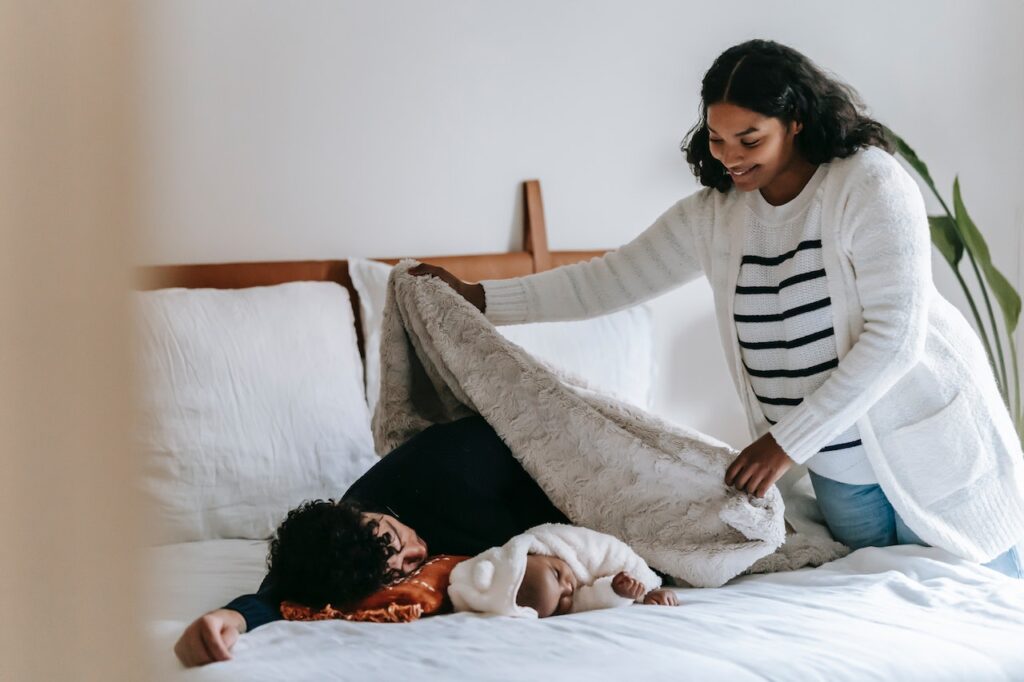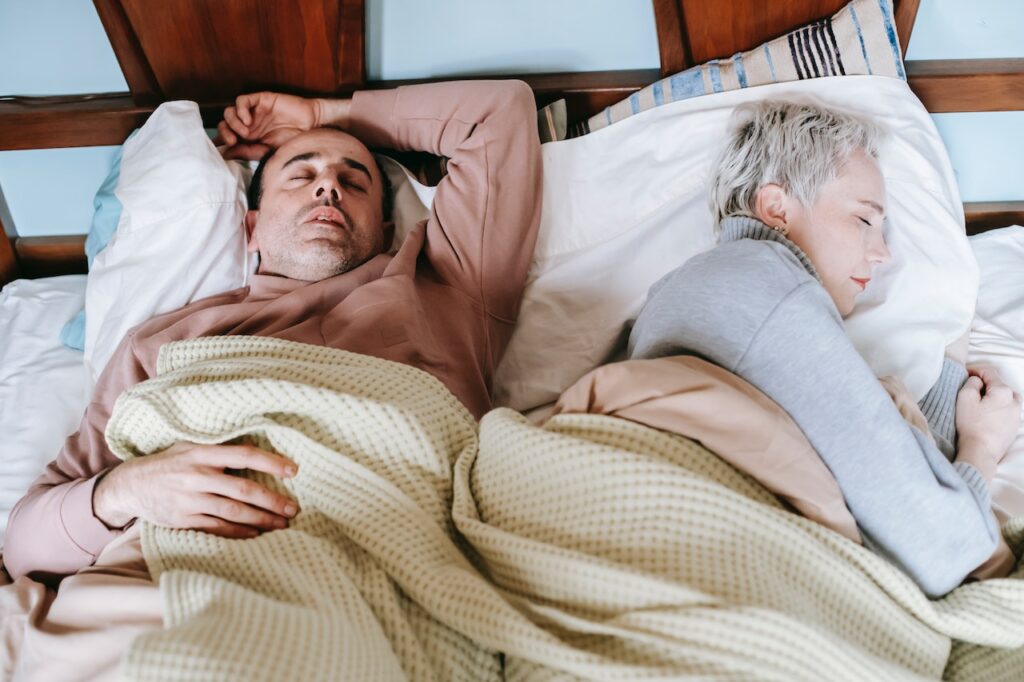Sleep hypnosis, much like other forms of hypnosis, is a technique designed to induce a state of relaxed awareness. This state makes you more receptive to suggestions. If you have high anxiety, consider our download, which is excellent expert sleep hypnosis for anxiety. The hypnotherapy suggestions can address common sleep issues and even more severe sleep disorders, ranging from sporadic night sweats to persistent insomnia.

When combined with guided meditation or other therapeutic approaches, sleep hypnosis for anxiety serves as an alternative to sleep aids. This is great, helping some individuals fall asleep quickly, experiencing deep sleep, and waking up feeling rejuvenated.
It’s worth noting that hypnotic suggestion may not be suitable for everyone. Nevertheless, research indicates that sleep hypnosis can be beneficial for those struggling with anxiety related sleep problems. Indeed our sleep hypnosis download does so by facilitating faster sleep onset and enhancing overall sleep quality, leading to a more revitalising deep sleep.
Sleep hypnosis for anxiety download
Now, let’s delve into the concept of hypnosis itself. Contrary to its portrayal in movies and popular media, hypnosis is not a mere stage trick. Psychologists widely recognise it as a valuable method for inducing relaxation and promoting general well-being (American Psychological Association, 2008; Chamine, 2018).
So, what exactly is hypnosis? Think of it as becoming engrossed in a captivating book, where your attention disconnects from reality, and the imagined world becomes vivid and real. Alternatively, you can liken it to a meditative state (Williamson, 2019).
Hypnosis, in and of itself, is not a therapy or treatment. Rather, it serves as a facilitator for therapies and treatments (American Psychological Association, 2008). As one researcher aptly put it, “Hypnosis does not enable the impossible to become possible, but it can assist patients in believing and experiencing what could potentially be achievable for them” (Williamson, 2019). As you will hear on our sleep download, you will begin to feel sleep as a more natural state and barriers to insomnia should fall away also, with repeated listening.
Scientific studies have also demonstrated the effectiveness of hypnotherapy in addressing pain, depression, anxiety, and various other mental and physical health issues (Jensen, 2015). Moreover, as we will explore further, it has also been shown to promote restful sleep.
What exactly is sleep hypnosis for anxiety? Sleep hypnosis itself refers to a form of hypnosis that aims to assist individuals in falling asleep and achieving improved sleep quality. It should be noted that sleep hypnosis does not involve hypnosis while actually sleeping, but you listen as you go to sleep and relax in bed.
During any type of hypnosis, including anxiety reducing sleep hypnosis, there is a decrease in brain activity related to multitasking and paying attention to various stimuli. Conversely, other brain systems responsible for processing and controlling bodily functions become more active.
Furthermore, connections in the brain that contribute to self-awareness and conscious reflection diminish. This creates a state of “disassociation between action and reflection,” enabling individuals to engage in activities suggested by a hypnotherapist without expending mental resources on self-consciousness about those actions (Jiang, 2017).

Can sleep hypnosis effectively address sleep and anxiety problems? Sleep hypnosis is considered a safe and promising approach for individuals experiencing sleep difficulties. Indeed our download for sleep has already helped countless people get a better night’s slumber. However, the research in this area is relatively limited, with studies often being small in scale and of varying quality. A review of scientific literature on sleep hypnosis revealed that 58% of the studies reported positive effects, 13% showed mixed results, and 29% yielded negative results (Chamine, 2018).
While not as extensively studied as psychotherapies such as cognitive-behavioural therapy (CBT) or mindfulness meditation, sleep hypnosis for anxiety appears to offer benefits for individuals with insomnia and other sleep-related issues, including hot flashes during menopausal transition, post-traumatic stress disorder (PTSD), and sleep terrors (Becker, 2014).
The specific mechanisms by which hypnosis aids in stress relief or addresses other mental health problems are not yet fully understood. However, they appear to vary from person to person and can encompass psychological factors like expectations, motivation, and willingness to be hypnotised, social factors such as the rapport with a hypnotherapist, and biological factors related to individual brain structure and functioning (Jensen, 2015).
CBT and sleep hypnosis for anxiety
Cognitive-behavioural therapy (CBT) is a therapeutic approach that focuses on identifying and modifying negative thought patterns and behaviours to improve mental health and well-being. It is widely used to address various conditions, including anxiety disorders, depression, phobias, and insomnia.
In a study highlighting the significance of an individual’s susceptibility to hypnosis based on factors like willingness, desire, or susceptibility, women participants were divided into two groups: those who were highly susceptible to hypnosis and those who were not. Both groups listened to sleep hypnosis downloads that aimed to enhance deep sleep before taking naps, and a subset of each group listened to neutral recordings unrelated to sleep.
During the nap period, their slow-wave activity, which serves as an indicator of deep and restorative sleep, was measured using an electroencephalogram (EEG). The results showed that on average, the highly susceptible women who listened to the “sleep deeper” message experienced 80% more slow-wave sleep and spent around one-third less time awake compared to those who heard the neutral message. The benefits of hypnosis were not as pronounced for individuals who were less susceptible to hypnosis (Cordi, 2014).
The approach to sleep hypnosis can vary significantly, ranging from short deep-sleep hypnosis audio recordings used at home to structured sessions of guided hypnotherapy lasting up to an hour, either in groups or on an individual basis. What is clear is that anxiety levels were affected positively also. Sleep hypnosis often targets underlying issues such as stress or pain that contribute to sleep difficulties. It is sometimes combined with other effective sleep-related therapies, such as cognitive-behavioural therapy (CBT) (Chamine, 2018).
How does sleep hypnosis work?
Inducing hypnosis typically involves focusing attention (known as hypnotic induction) on stimuli like a candle flame, sleep music, chanting, or muscle relaxation techniques (Williamson, 2019). During a sleep hypnosis session, you may be encouraged to recall memories of when you slept well and falling asleep was easier. Visualisation techniques, such as imagining relaxing scenes like fish diving deeper into the water, might be taught. Our sleep hypnosis for anxiety download uses these and other powerful tools t help you relax at night. The goal is really to teach individuals how to practice self-hypnosis, as research suggests it can be effective. For instance, menopausal women experiencing poor sleep and hot flashes reported significant improvements in sleep quality and duration after utilizing self-hypnosis techniques (Otte, 2020).
Sleep hypnosis is generally considered to be a safe approach for addressing sleep problems. However, it’s important to note that following a hypnosis session, you may not have clear recollection of the experience (Chamine, 2018; Becker, 2015). This is totally normal and nothing to be concerned about.
There are various other approaches to addressing sleep problems as well, including engaging in regular physical activity, maintaining a healthy diet, establishing a consistent sleep schedule, and avoiding stimulating activities before bedtime. These methods can complement sleep hypnosis for anxiety and contribute to overall sleep improvement. For information about our sleep hypnosis download click here.
